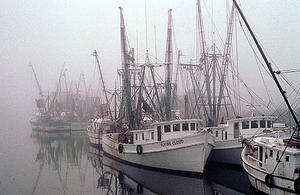The food we eatOil spill threatens a range of Gulf coast food stocks
University of Arizona researchers said more than 240 kinds of “historically eaten, place-based foods” are at risk for being lost from what has been a cornucopia for generations of Gulf Coast residents. The majority of food items on that list are there because of the oil spill; oysters, crayfish, brown shrimp, redfish, grouper are at risk, as well as Tabasco sauce, okra, and gumbo file

Idle shrimp boats on the Gulf of Mexico // Source: blogspot.com
Add to the list of threats from the Deepwater Horizon oil spill in the Gulf of Mexico the potential and real loss of unique regional foods and the hardships that loss creates for the often economically disadvantaged people who depend on them.
In a new report, University of Arizona researchers, working with the Renewing America’s Food Traditions Alliance, or RAFT, said more than 240 kinds of “historically eaten, place-based foods” are at risk for being lost from what has been a cornucopia for generations of Gulf Coast residents. The majority of food items on that list are there because of the oil spill, said Gary Nabhan, a research social scientist with connections to the Southwest Center and the Tumamoc People and Habitats Program, both at the University of Arizona.
“Coastal and rural communities around the Gulf of Mexico provide most of the oysters, crayfish, brown shrimp, redfish, grouper and other marketable seafood eaten in the United States,” Nabhan said. “While we don’t endorse or condone the consumption of federal or state protected species, contaminated or depleted stocks, our goals are to avoid both the loss of species and of Gulf Coast communities,” he added.
Besides seafood, Nabhan said Gulf Coast residents also provide many other unique products to the American food system — from Tabasco sauce to okra and gumbo file – that are likely to be indirectly affected if disruption of the seafood industry triggers more out-migration from the region.
The RAFT study, which began four years before the Deepwater Horizon accident, is based on archival research, oral history documentation and participatory workshops with farmers, fishers, food historians, chefs and conservation biologists. The study was edited and introduced by Nabhan, Leigh Belanger, program director for Chefs Collaborative, and a recent UA graduate, Regina Fitzsimmons.
It is, said Nabhan, the first assessment of how the million gallons of oil already let loose in the Gulf of Mexico may have long-term impacts on the food biodiversity upon which the regional economy depends.
“If the rarest of these food resources become depleted any further, their harvesters will surely lose their livelihoods, but consumers and chefs should not refrain from purchasing the safe, clean and sustainably harvested foods that Gulf Coast communities provide,” he said. “We need to find tangible ways to support these fishermen, oystercatchers and shrimpers because many are from the marginalized ethnic groups in the United States.”
Those “marginalized peoples” of the Gulf Coast include low-income families from a variety of native and immigrant groups including Cajun, Creole Black, Houma Indian, Cambodian, Vietnamese, and Latino food producers.
More information is available online at Slow Food USA and at Nabhan’s home page.
